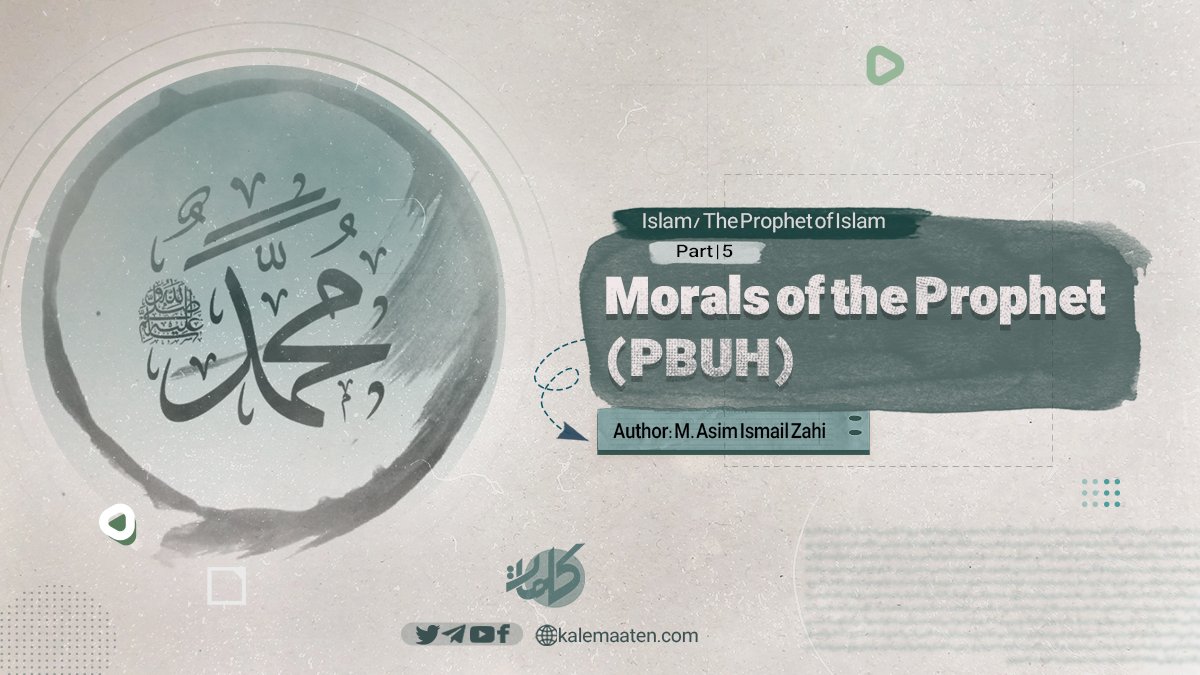
Author: M. Asim Ismail Zahi
Morals of the Prophet “PBUH” (Part 5)
3. Listening to the Words and Optimism of the Believers
The Prophet of Islam, peace be upon him, not only valued moral values but also embodied moral virtues and high human values in his practical life. In all aspects of life, he faced events with a cheerful demeanor and eloquent words. Almighty Allah has said: «وَمِنْهُمُ الَّذِينَ يُؤْذُونَ النَّبِيَّ وَيَقُولُونَ هُوَ أُذُنٌ قُلْ أُذُنُ خَيْرٍ لَكُمْ يُؤْمِنُ بِاللَّهِ وَيُؤْمِنُ لِلْمُؤْمِنِينَ وَرَحْمَةٌ لِلَّذِينَ آمَنُوا مِنْكُمْ وَالَّذِينَ يُؤْذُونَ رَسُولَ اللَّهِ لَهُمْ عَذابٌ أَلِيمٌ»; And among them, there are those who hurt the Prophet and say that he is quick to believe. Say: “It is for your benefit that he is quick to believe, for he believes in Allah and the believers. Allah’s mercy is for those of you who believe, and for those who hurt the Messenger of Allah, there is a painful punishment.”
In this verse, it refers to a person or people who used to harass the Prophet, peace be upon him, with their words and claimed: “He is gullible and open-minded.” The word «اُذُن» originally means “ear,” but it is also applied to people who listen attentively to others. In fact, they regarded this strength of the Prophet, peace be upon him—an essential quality in a leader—as a weakness. They were oblivious to the fact that a popular leader must show the utmost kindness and love and accept people’s excuses as much as possible. They should not expose others’ faults unless it leads to abuse; rather, they should open their doors to the people as much as possible, listen to their concerns, and strive to fulfill their needs and promote their interests.
The Prophet, peace be upon him, was a unique leader who surpassed everyone in this field and became an eternal model for the world, as seen from the perspective of the Qur’an.
Therefore, the Qur’an immediately adds that: “And tell them if the Prophet listens to your words and accepts your excuse and is gullible in your opinion, this will be in your favor”; because in this way it preserves your reputation and doesn’t crush your personality; He doesn’t hurt your feelings and tries to preserve your love, unity and unity in this way, whereas if he immediately raised the curtains and scandalized the liars, you would be in a lot of trouble. In addition, the reputation of some people was destroyed, the way of return and repentance was also closed for them, and the infected people who could be guided took a place in the ranks of the evildoers and scattered around the Prophet, peace be upon him.
A kind and caring leader, mature and wise at the same time, should understand all the shortcomings, but he should not dwell too much on them, so that those who deserve to be trained are nurtured and do not shy away from his guidance, and the secrets of the people do not fall from the veil. These meanings are reflected in the verse itself, where Allah responds to those who seek fault: It isn’t that He listens to all words, but He listens to words that benefit you and your well-being; that is, He hears divine revelations, listens to useful suggestions, and accepts people’s apologies in cases that benefit them and society.
To prevent the fault-finders from misusing this statement and using it as an excuse, He adds: “He believes in Allah and His commandments, listens to the words of the true believers, accepts them, and acts accordingly.” This implies that the Prophet, peace be upon him, operates on two levels: one program aims to maintain appearances and prevent veiling, while the other is implemented in the action phase. At the first level, he listens to everyone’s words and apparently does not deny, showing the peak of philanthropy. However, in terms of actions, he only pays attention to the commandments of Allah and the suggestions and words of the true believers. A realistic leader should embody these qualities, as this is the best way to secure the interests of society. Therefore, it is said that he is a mercy for the believers.
4. Great Compassion for the Nation
Almighty Allah has said: «فَلَعَلَّكَ بَاخِعٌ نَّفْسَكَ عَلَى آثَارِهِمْ إِن لَّمْ يُؤْمِنُوا بِهَذَا الْحَدِيثِ أَسَفًا».
“And perhaps you will spend your life in despair over their actions, deeply regretting why they do not believe in this saying.”
A few points should be noted about this verse:
a) «باخع» (“Bakha”) (from the root «بخع») means to destroy oneself due to the intensity of grief or, in other words, “to die.”
b) The word «اسفا» (“asfa”) conveys the intensity of sadness; it is an emphasis on this sentiment.
c) The plural of «آثار» (“asar”) originally means footprints, but it can refer to any signs that remain of something.
d) The choice of this interpretation in the above verses refers to a subtle point: sometimes a person leaves a place, and because the story is new, their works remain fresh. But as time passes, the traces fade. In other words, you are so distressed by their lack of faith that even before their works disappear, you wish to end your own life in grief. It may also refer to their actions and behavior.
e) The interpretation of «حدیث» (“hadith”) regarding the Qur’an refers to the innovation of this great heavenly book; at the very least, they failed to examine this new text with its novel content. This illustrates the depth of ignorance when one disregards such an important new issue.
Continues…



